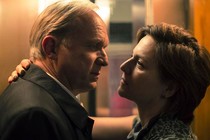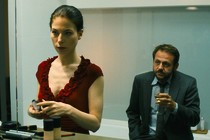Revanche
- A highly subtle existentialist auteur film under the guise of a captivating thriller, which is confirmation of the profound talent of Austrian director Götz Spielmann
In a brothel in Vienna’s red-light district, two secret lovers dream of another life: Alex, a simple security guard at the establishment, and Tamara, an Eastern European prostitute. At once hardened and fragile, they carry out a bank robbery in order to try to escape their lives as victims of society’s underbelly.
On the surface, this appears to be the subject of Austrian director Götz Spielmann’s Revanche [+see also:
trailer
interview: Götz Spielmann
film profile], which won the Europa Cinemas Label Award in the Panorama section at last year’s Berlinale and was nominated for the 2009 Best Foreign Language Film Oscar. But even though the director creates the impression of a thriller with an accomplished combination of suspense and drama, he ultimately produces a much more complex work in which auteur film subtly triumphs over the genre format.
The first key to the understated originality of Revanche lies in the way the plot shifts to the countryside. Here, Alex’s grandfather – a widower strongly attached to his farm (Hannes Thanheiser) – lives not far from the small town where his grandson commits his robbery.
In this new environment, two other characters emerge: local policeman Robert (Andreas Lust) and his wife Susanne (Ursula Strauss), a friend of the old farmer. The destinies of the couple, who are unable to have children, intertwine with those of Alex (a remarkable Johannes Krisch) and Tamara (Irina Potapenko).
The protagonists, brilliantly portrayed by the cast, are patiently woven by the director (who wrote the screenplay) into a web that echoes the psychological force of Greek tragedy, where fate and free will constantly conflict with one another.
And the sudden switch from an aggressive urban setting – made up almost entirely of interiors – to natural surroundings (forest, fields and lake) shifts the film from noise to silence. This is like a reflection of Alex’s evolution, as he is plagued by the desire to take revenge after the bank robbery takes an unexpected turn.
Sensitively exploring a diverse range of themes, including guilt, the chaotic search for identity and life’s bizarre coincidences, Revanche proves to be particularly rich in existential questions, beneath its tangible outer form. Like Alex, who uses a saw and axe to vigorously cut the wood in preparation for winter, Spielmann cleverly constructs his film, incorporating numerous levels of meaning and interpretation as he pursues his main objective: an attempt at understanding the essence of life and the positive impact of catharsis.
This aim is accompanied by a pure visual style and sober tone, which enhance the brilliant framing and lighting by DoP Martin Gschlacht (who won acclaim for his work on Spielmann’s Antares, Jessica Hausner’s Hotel [+see also:
trailer
film profile] and Barbara Albert’s Free Radicals).
An experienced director, Spielmann (47) was discovered at the start of his career by major festivals but only has six features to his name. He seems to have reached a promising artistic maturity that rests on a delicate balance between his command of plot mechanisms and a quasi-documentary realism. It will be interesting to follow his future development.
Produced by Prisma Film and Spielmannfilm, Revanche received backing from the Austrian Film Institute, the Vienna Film Fund, the ORF and the Southern Austrian Region. International sales were handled by The Match Factory.
(Translated from French)
Did you enjoy reading this article? Please subscribe to our newsletter to receive more stories like this directly in your inbox.























